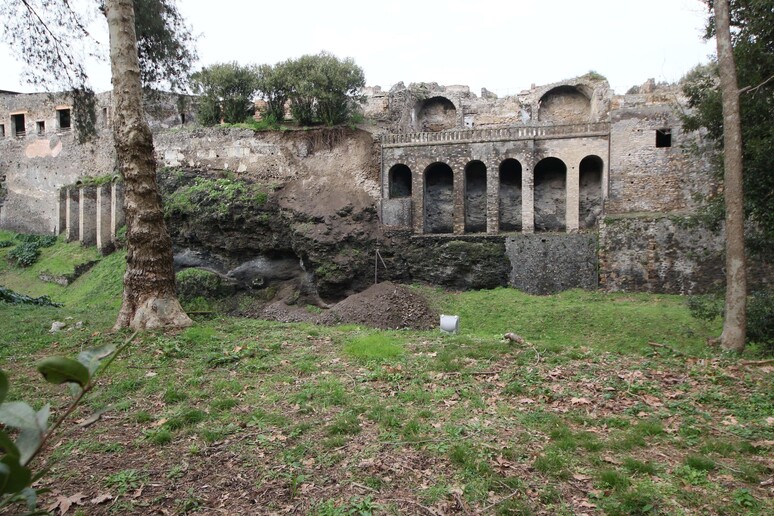Part of a garden in a house in Pompeii gave way because of heavy rains Wednesday in the latest in a rash of storm-linked collapses at the storied Roman site.
Also Wednesday, police said they had found evidence tomb raiders were operating just outside the ancient city buried by Vesuvius in 79 AD.
The structural collapse was in the part of the digs that are being renovated thanks to a new, EU-funded Great Pompeii Project. Some of the garden wall at the House of Severus also collapsed, it said. It was the latest in a string of collapses in the ancient Roman site in recent years.
Premier Matteo Renzi has vowed action to save Pompeii after UNESCO warned it could collapse completely without "extraordinary measures" and the EU called for urgent action.
Renzi said Italy should "get over an ideological refusal" to involve the private sector in cultural projects after the collapses led the government to earmark two million euros for urgent repairs.
Renzi said Culture Minister Dario Franceschini "intervened promptly" by allocating the money after the latest three in a long series of rain-linked collapses at the 2,000-year-old ancient Roman site near Naples, the world's most famous open-air museum and one of Italy's biggest tourist attractions.
UNESCO in July 2013 gave Italy until the end of that year to apply a series of upgrade measures or face having Pompeii removed from its prestigious list of World Heritage sites.
The measures included video surveillance of 50% of the area and a buffer zone around the site.
Rome implemented most of the measures and got an extended deadline for the others.
Heavy rain was blamed for a wall of a Roman-era shop collapsing in Pompeii in March 2014, a day after two other precious parts of the ancient city - a wall at the Temple of Venus and another wall on a tomb in the famed necropolis of Porta Nocera - suffered serious damage from bad weather.
These followed a long and worrying catalogue of bits of Pompeii falling off.
In November 2010 the House of the Gladiators came down, prompting Italian President Giorgio Napolitano to say: "This is a disgrace for the whole of Italy".
In February 2012 a piece of plaster came off the the Temple of Jupiter, one of Pompeii's main attractions.
Then, in September 2012, at the Villa of the Mysteries, an even more iconic building, a five-metre-long flying buttress gave in and went crashing to the ground.
In November 2013, finally, a wall in one of the ancient city's main thoroughfares, Via dell'Abbondanza, keeled over while another piece of decorative plaster, at the House of the Little Fountain, dropped from the ceiling.
In December 2013 Italy named the former head of its prestigious art-theft unit to head up the ambitious Great Pompeii project.
Giovanni Nistri, a general in the paramilitary Carabinieri police who led Italy's cultural asset-protection division from 2007 to 2010, had "the right sensitivity for this job", then culture minister Massimo Bray said at the time.
Pompeii has been plagued for decades by accusations of mismanagement, neglect and even infiltration by the local Camorra mafia.
TOMB RAIDERS 'ACTIVE' AROUND POMPEII, AT PAESTUM.
Also Wednesday, police said they had found evidence that a gang of tomb raiders was active near Pompeii, on "other parts of the slopes of Vesuvius", and at the famed ancient Greek site of Paestum south of Naples.
They placed 142 people under investigation and seized about 2,000 plundered artefacts.
Some links to the Camorra were uncovered, although the suspected raiders acted "mostly off their own bat," police said.
ALL RIGHTS RESERVED © Copyright ANSA











